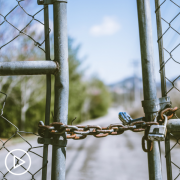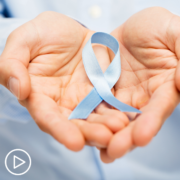What Are Some Practical Solutions to Prostate Cancer Care Barriers?
What Are Some Practical Solutions to Prostate Cancer Care Barriers? from Patient Empowerment Network on Vimeo.
Are there practical solutions to removing prostate cancer care barriers? Host Dr. Nicole Rochester, Dr. Yaw Nyame, and Dr. Petros Grivas provide insight on how solutions to barriers can be approached and share some support resources for improved patient outcomes.
See More From Best Prostate Cancer Care No Matter Where You Live
Related Resources:

What Barriers Do Prostate Cancer Patients Face When Seeking Care? |

|
Transcript:
Dr. Nicole Rochester:
Let’s shift to solutions and what are some of the solutions that you all recommend for some of these barriers, as physicians, a lot of that is going to be out of your purview, but I’d love for each of you to suggest any solutions for our patients and care who may be facing some of these barriers, so this time we’ll start with you, Dr. Nyame.
Dr. Nyame:
This is an area where I think we need to do better in collecting information to understand where the need is, and so I think there is a very much a need for translational health services or patient-centered research, where we do the simple thing, if I was going to open up a lemonade stand in the middle of Seattle, I’d probably ask a few people what their needs are around lemonade before I open the stand, and I think in medicine, we often offer our services and solutions without having had that simple conversation of What are the needs? I think in addition to that, we have to understand that equitable care might mean offering additional services for certain populations, so for us at our cancer center, for instance, we’ve recently instituted a patient navigator program, something that’s been around for a long time, and other sites but it’s allowing us to do that, go through that exercise of providing some equitable care by helping people coordinate appointments, find their way to financial resources that might support them, and just to be there as a support in the very difficult time of having a new cancer diagnosis, so I think that’s a well-proven and well-established method for helping people get access to care.
The other thing I’ll add is that we make decisions, I think as humans, we make decisions through community, and sometimes that’s our partner, sometimes that somebody at the gym, sometimes that’s a co-worker, and there are a lot of really fantastic patient advocacy networks that exist that can help people find this new community, and I think cancer patients share a very unique bond and in a very unique way to communicate with one another because they’re living through this particular diagnosis, and so for in the case of prostate cancer, especially prostate cancer in Black men, you have the Prostate Health Education Network, you have Zero Cancer, you have Us TOO, you have the Prostate Cancer Foundation, probably leaving some advocacy groups off and I’m probably going to get in trouble, but I think that there’s that opportunity to reach out to others and just learn…what did you go through, what worked for you? How can I meet my goals of care through just conversation with other patients and survivors, and I’ll try to leave something for Dr. Grivas to the conversation because clearly I could go on and on.
Nicole Rochester:
Dr. Grivas?
Dr. Grivas:
I’ll tell you that I’m learning every day from Dr. Nyame, his fantastic work in this important topic, and I think he covered the answer so well. If I can just add a few more things just to expand on this of sorts, and these are things that already he’s doing in his programmatic development in our institution as well. I think one of the important things we have to acknowledge all of us is the issue of systemic racism and implicit bias that I think you referred to Dr. Rochester. I think the more we talk about, the more transparent we are with it, the better because we can think about what are unconscious or subconscious thoughts that we may have, you know, “This patient doesn’t care about themselves. Why should we go the extra mile to help them?” We should go the extra mile to help them, because this patient may have less inside of the situation, and they need more resources and as a healthcare system, we should try to earn that patient, right? We should not let that patient go, because every patient matters, right? And I think every life matters. I think that’s important. I think overall a systemic issue to discuss. The other thing is getting our sense of the community, and I think the examples of studies we have done in the clinic and other areas that we try to utilize the wisdom and the help of local leaders in those communities for example, underserved populations go to local churches or barber shops or gyms as Dr. Nyame mentioned and collaborate, work with the local leaders and see how we can have a dialogue with the patients there? How can we establish this trust that may be missing, how we can convey that health is important, and prevention is important, and treatment is important, how can we help with financial constraints, right? How can we get patients to the cancer center without them having to worry about how to get there, how can we reach out and have screening in the present county screening in the community, if it’s indicated then access to care telemedicine, and that brings an issue, do the patients have equipment for telemedicine, a computer, we take it for granted, but it may not be. So given those resources, organizing some local centers with this Men’s Health Day, just to get people in a room and educate them, but also learning from them what are the barriers to take it into account, not talk down to them, but learning with them and from them.
The other thing is research and that will have to do a better job to include an offer in an equitable manor clinical trials to our patients including patients from different races and we are doing, I think, overall, okay, but we are not doing enough, we have to do better in order to provide this opportunities to our patients and the role of patient navigators is great. We can set examples, and we have patients who feel much more comfortable when they have a patient navigator. Sometimes if it happens to be in the same race with a patient then the patient feels more comfortable. They have someone that they can trust or it will be easier to talk to, and I think we should definitely improve and work harder to provide access to research inequitable manor to our patients. The last point I would say is, patient co-pay assistance programs and foundations, I think we can definitely include more resources to our patients, philanthropy, foundation support and state programs in order to give those patients the resource they need again to achieve this holy grail, which is equitable health care.











